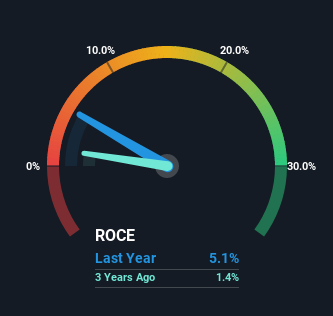Returns On Capital Signal Tricky Times Ahead For Genesys International (NSE:GENESYS)
If we want to find a stock that could multiply over the long term, what are the underlying trends we should look for? One common approach is to try and find a company with returns on capital employed (ROCE) that are increasing, in conjunction with a growing amount of capital employed. Put simply, these types of businesses are compounding machines, meaning they are continually reinvesting their earnings at ever-higher rates of return. Having said that, from a first glance at Genesys International (NSE:GENESYS) we aren't jumping out of our chairs at how returns are trending, but let's have a deeper look.
What Is Return On Capital Employed (ROCE)?
If you haven't worked with ROCE before, it measures the 'return' (pre-tax profit) a company generates from capital employed in its business. The formula for this calculation on Genesys International is:
Return on Capital Employed = Earnings Before Interest and Tax (EBIT) ÷ (Total Assets - Current Liabilities)
0.051 = ₹206m ÷ (₹4.7b - ₹692m) (Based on the trailing twelve months to December 2022).
Thus, Genesys International has an ROCE of 5.1%. In absolute terms, that's a low return and it also under-performs the IT industry average of 13%.
See our latest analysis for Genesys International

While the past is not representative of the future, it can be helpful to know how a company has performed historically, which is why we have this chart above. If you'd like to look at how Genesys International has performed in the past in other metrics, you can view this free graph of past earnings, revenue and cash flow.
The Trend Of ROCE
Unfortunately, the trend isn't great with ROCE falling from 8.4% five years ago, while capital employed has grown 49%. That being said, Genesys International raised some capital prior to their latest results being released, so that could partly explain the increase in capital employed. Genesys International probably hasn't received a full year of earnings yet from the new funds it raised, so these figures should be taken with a grain of salt.
The Bottom Line On Genesys International's ROCE
While returns have fallen for Genesys International in recent times, we're encouraged to see that sales are growing and that the business is reinvesting in its operations. In light of this, the stock has only gained 32% over the last five years. Therefore we'd recommend looking further into this stock to confirm if it has the makings of a good investment.
One more thing: We've identified 4 warning signs with Genesys International (at least 1 which is a bit unpleasant) , and understanding them would certainly be useful.
While Genesys International may not currently earn the highest returns, we've compiled a list of companies that currently earn more than 25% return on equity. Check out this free list here.
New: Manage All Your Stock Portfolios in One Place
We've created the ultimate portfolio companion for stock investors, and it's free.
• Connect an unlimited number of Portfolios and see your total in one currency
• Be alerted to new Warning Signs or Risks via email or mobile
• Track the Fair Value of your stocks
Have feedback on this article? Concerned about the content? Get in touch with us directly. Alternatively, email editorial-team (at) simplywallst.com.
This article by Simply Wall St is general in nature. We provide commentary based on historical data and analyst forecasts only using an unbiased methodology and our articles are not intended to be financial advice. It does not constitute a recommendation to buy or sell any stock, and does not take account of your objectives, or your financial situation. We aim to bring you long-term focused analysis driven by fundamental data. Note that our analysis may not factor in the latest price-sensitive company announcements or qualitative material. Simply Wall St has no position in any stocks mentioned.
About NSEI:GENESYS
Genesys International
Provides geographical information services in India and internationally.
Solid track record with adequate balance sheet.
Similar Companies
Market Insights
Community Narratives



